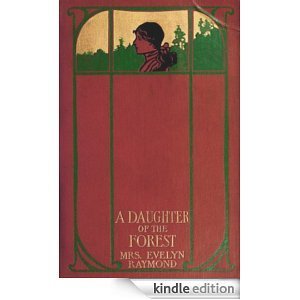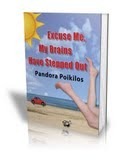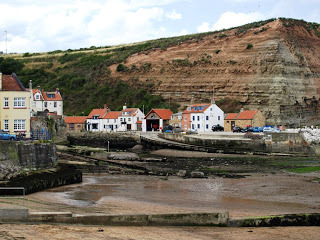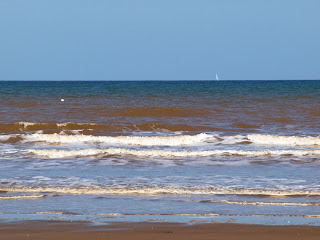Stuart Aken's Blog, page 295
August 8, 2011
Stuart's Daily Word Spot: Synecdoche
 Synecdoche: A figure ofspeech in which a part is used to represent the whole.
Synecdoche: A figure ofspeech in which a part is used to represent the whole. Examples:
Describing a vehicle as 'wheels''grey beard' for an older man'hands' for workers as in, 'All hands on deck.''the good book' for the Bible'bug' for any kind of insect 'glasses' for spectacles'irons' for shackles used to restrict a prisoner'rubber' for a condom.
Pic: Californian Poppies.
Published on August 08, 2011 07:00
August 7, 2011
A Daughter of the Forest, by Evelyn Raymond, Reviewed.
 This book was not previously known to me but I suspect itmay be an American classic from the last century. The writing style, combinedwith the eclectic and slightly overblown vocabulary, suggests a work of thelate 19th or early 20th century to me.Unprepared as I was for this mode of storytelling, in which thenarrator slips readily from one point of view to another, making thinly-veiledauthorial comments along the way, I almost stopped reading after the firstcouple of chapters. However, there was something intriguing about the innocenceof both characters and storyline that persuaded me to persevere with it. I'mglad I did.The story slowly comes to life, as the interaction of thediverse characters explains central aspects, whilst laying on further layers ofmystery. The simple life of early America in the wilderness is vividlydescribed and contrasts excellently with the later depiction of chaotic andexuberant New York.That the ending was obvious detracts not at all from thislovely little story that leaves the reader feeling uplifted and happier withthe human condition.
This book was not previously known to me but I suspect itmay be an American classic from the last century. The writing style, combinedwith the eclectic and slightly overblown vocabulary, suggests a work of thelate 19th or early 20th century to me.Unprepared as I was for this mode of storytelling, in which thenarrator slips readily from one point of view to another, making thinly-veiledauthorial comments along the way, I almost stopped reading after the firstcouple of chapters. However, there was something intriguing about the innocenceof both characters and storyline that persuaded me to persevere with it. I'mglad I did.The story slowly comes to life, as the interaction of thediverse characters explains central aspects, whilst laying on further layers ofmystery. The simple life of early America in the wilderness is vividlydescribed and contrasts excellently with the later depiction of chaotic andexuberant New York.That the ending was obvious detracts not at all from thislovely little story that leaves the reader feeling uplifted and happier withthe human condition.
Published on August 07, 2011 11:34
Stuart's Daily Word Spot: Habitation
 Habitation: noun -the act of living in or inhabiting; occupation by inhabitants; place of abode, dwellingplace; especially a house or a home; a settlement.
Habitation: noun -the act of living in or inhabiting; occupation by inhabitants; place of abode, dwellingplace; especially a house or a home; a settlement. 'The communal longhouse, nestling under the towering treesof the rainforest, was a welcome habitation for the tribe, but Jonathan couldnever really come to terms with it as his home.'
Pic: the pond at Little Driffield.
Published on August 07, 2011 07:00
August 6, 2011
Stuart's Daily Word Spot: Jealousy or envy?
 Jealousy: noun - overwhelmingfear, suspicion, or belief one is, or might be, displaced in someone'saffections; distrust of the faithfulness of a spouse or lover; of God - Hisintolerance of the worship of other gods (which has always struck me as an oddquality in a being supposed to be omniscient and almighty); resentment or envyof another person or his or her possible or actual success, advantage, orsuperiority; rivalry; concern or anxiety for the preservation or well-being ofsomething or someone; vigilance or care in guarding something or someone.Envy: noun - feelingof resentful or discontented longing aroused by another person's betterfortune, situation.
Jealousy: noun - overwhelmingfear, suspicion, or belief one is, or might be, displaced in someone'saffections; distrust of the faithfulness of a spouse or lover; of God - Hisintolerance of the worship of other gods (which has always struck me as an oddquality in a being supposed to be omniscient and almighty); resentment or envyof another person or his or her possible or actual success, advantage, orsuperiority; rivalry; concern or anxiety for the preservation or well-being ofsomething or someone; vigilance or care in guarding something or someone.Envy: noun - feelingof resentful or discontented longing aroused by another person's betterfortune, situation.As is so often the case with alternatives in English, itsvocabulary culled from so many different languages, there is some overlap inthe meanings of these two words. However, jealousy is generally used to conveythe emotions felt in areas of possession and protection, and envy generallyexpresses a desire to actually have what the other person has (instead of them,rather than as well as).
'One day, your insane and unfounded jealousy will drive awedge between us, destroy all the love I feel for you, and send me out of yourlife for good.'
'Mary guarded her new baby with that jealousy only the newmother knows.'
'Derek was consumed by envy of his neighbour to the extenthe plotted murder so that he might take all those things he thought the man hadbut didn't deserve.'
Published on August 06, 2011 07:00
August 5, 2011
Stuart's Daily Word Spot: Syllogism
 Syllogism: noun - aform of reasoning where a conclusion is deduced from two propositions referred toas the premises, which include a common or middle term absent from theconclusion (e.g. All Ds are Es, all Es are Gs, therefore all Ds are Gs); a typeor method of reasoning or something regarded as such, especially one that isspecious or subtle; an artifice, a trick, often jocular or ironic.
Syllogism: noun - aform of reasoning where a conclusion is deduced from two propositions referred toas the premises, which include a common or middle term absent from theconclusion (e.g. All Ds are Es, all Es are Gs, therefore all Ds are Gs); a typeor method of reasoning or something regarded as such, especially one that isspecious or subtle; an artifice, a trick, often jocular or ironic. In Aristotle's Prior Analytics, he definessyllogism as 'a discourse in which, certain things having been supposed,something different from the things supposed results of necessity because thesethings are so.' e.g:
Major premise: All women are beautiful.Minor premise: All mothers are women.Conclusion: All mothers are beautiful.
Eachof the three distinct terms represents a category. In the above example, 'women', 'beautiful' and 'mothers'; 'beautiful' is the major term, 'mothers' the minor term. Thepremises also have one term in common with each other, which is known as the middle term; in this example, 'women'. Both of the premises are universal, as is the conclusion.
Pic: Honey bee on garden flowers.
Published on August 05, 2011 07:00
August 4, 2011
Author Interview with Pandora Poikilos
 Who is Pandora Poikilos?
Who is Pandora Poikilos?I have received some "get to know you"questions. So, here's a peek at the questions that have been asked, and therandom ones that no one asked but I felt like answering anyways, in noparticular order.
Most popular question, is Pandora Poikilos areal name?
Now, if it's real or not, after having itbroadcast all over the internet am I really going to tell one individual whoasks me in a blog comment? Some pseudonyms I have used include, MarjorieAbraham and Andrea Nelson.
What do you think was the most difficult partof growing up and why?
Not too sure if I'm all grown up (loads more togrow mentally) but I'd have to say the most difficult part is learning thatpeople you trust can betray you for the smallest of returns.
How old are you?
Old enough, 17 April 1976
What's the ideal dream job for you?
What I have right now. To write.
HelloPandora, please tell us about you, as a writer.
For aslong as I can remember, I have always wanted to write. My first article waspublished in a local paper when I was 13. Not only did it feel like it was the bestthing in the world, the only time when I feel right with myself is when I amwriting.
 Your book'Excuse Me, My Brains Have Stepped Out'has been described as Women's Fiction; perhaps you'd you give us some insightinto it in a few sentences.
Your book'Excuse Me, My Brains Have Stepped Out'has been described as Women's Fiction; perhaps you'd you give us some insightinto it in a few sentences. The bookdeals with Anya's story which is woven into layers of misunderstandings, a rareneurological disorder and an issue that we all deal with, acceptance. Moreimportantly the book deals with moving on. Life has a habit of handing us apause button and sometimes we can't seem to move past it, this book doesn'tshow you how in a step by step way, it is proof that you can move pasttragedy or loss.
How didyou come to write this particular book?
I wasdiagnosed with IIH (Intracranial Hypertension) some years ago. Life has beendifficult to say the least. I had a VP shunt surgery done last year. Writing abook was always a goal I had for myself and there's nothing like brain surgeryto get you going and so the book was finished between pre-surgery jitters andpost-surgery boredom.
Do youhave a favourite character from the book? If so, who and why this particularone?
It wouldbe the chapter and character known as "Calm Amidst the Storm" whichtalks about a friend who holds you up and takes you across the finish line whenall you want to do is drop out of the race.
Where canpeople buy your books?
Amazon,Barnes & Noble and Smashwords for now. More sale venues will be comingsoon. Amazon - http://www.amazon.com/Excuse-Brains-Have-Stepped-Out/dp/0983197873/Smashwords- http://www.smashwords.com/books/view/53084
What qualities does a writer need to be successful?
Resilience,Humility, Diligence.
What's your workingmethod?
I must have pen and paper.Traditional and old fashioned I know but my words will not come otherwise. Onceit is written out, it is typed out, edited and so on. Also, I do set asidewriting time which is uninterrupted time solely for working on my current book,short stories or my non-fiction pieces (also known as Dora's Essentials).
What's the single biggestmistake made by beginner writers?
They give up too easily. Theywrite to a few B-I-G publishing companies, get turned down and then they tellthemselves it's not worth the effort. Imagine if Dickens believed everythingpeople said about him.
To what extent are grammarand spelling important in writing?
I think it makes the differencebetween an easy read for the reader and a good writer who conveys his story.Neither can happen without good grammar and spelling. Understood, that allbooks cannot be perfect and errors can be found but when you find a spellingerror in every sentence, what does that tell you of the writer and will thereader keep reading?
How much do you reviseyour MS before sending it off?
To the point that looking at itmakes me want to throw up. I only send it off when I am sick of it. As long asI am turning the pages making changes, I'm not done with it and I'm not happywith it. And if I'm not happy about it how will my readers enjoy the book?
As a writer, to whatextent do you think genre is useful in the publishing world?
I think it is very useful. Itprovides a sense of direction. You can't just write a book and say I wroteabout 'everything'.
Many authors see marketingas a bind. What's your opinion on this, and how do you deal with it?
This a frequent and ongoingdiscussion isn't it? I think to a large extent the publishing industry hasbecome a much wider circle than it used to be. But with this comes a largesupply that may or may not have a demand for it. Hence, the process of coercingthe supply towards the demand. I've had my moments when marketing has reallygot to me but utilising social media has been a wonderful tool in aiding mymarketing efforts. But as with anything in life, social media marketing has tobe consistent before successful results are seen.
What sort of displacementactivities keep you from writing?
Noise. I get distracted easilywith phones ringing, dogs barking. While this is not an activity it definitelyflushes out ideas from my head.
What support, if any, doyou receive from family and friends, or a writing group?
I have a few close friends I cango to and there is my partner (Peas as he is known to my readers) who becomesmy virtual 'punching bag', critic and idea bag. I think it is important for anywriter to have people like these around. It's one thing to have someone closeto you read it and say, "that's a great piece" but it's completelyanother for them to say, "you can do better". Sometimes we becomecomplacent and we need people close to us to nudge us along.
Is presentation of the MSas important as agents and publishers suggest?
I think it is. A well presentedMS usually means effort. If the writer doesn't make an effort on his own MS,again, how will the reader be affected?
How long does it take youto write a novel?
About 3 months, it's the editingthat takes me longer.
Who or what inspires yourwriting?
My partner, Peas. Call him a museif you must but our conversations have sparked more than just one or twochapters of my work.
If there's a single aspectof writing you find frustrating, what is it?
None that I can think of.
Is there a particularfeature of writing that you really enjoy?
Reaching out to people. Nothingin the world tops the feeling of communicating with a reader who has somethingto say about your book.
Do you believe creativewriting is a natural gift or an acquired skill?
I think it's a little of both, apleasant mix if you must. It comes naturally then you tame it with sometraining and chances are, a masterpiece is born.
What are you writing now?
My second novel, Frequent Traveler, which will bereleased on November 6.
Do you have a website orblog where readers can visit?
Sure. My blog is - http://peacefrompieces.blogspot.com/ andmy website is http://pandorapoikilos.com/Contactinfo is as follows
twitter - pandorapoikilos
facebook -pandorapoikilos
google talk - pandorapoikilos
Given unlimited resources,where would you do your writing?
On a beautiful island with veryfew people, a comfortable house and Internet.
Where do you actuallywrite?
Curled up on my sofa with my MP3player in my ears.
Published on August 04, 2011 08:30
Stuart's Daily Word Spot: Gable
 Gable: noun - verticaltriangular portion of wall at the end of a ridged roof, from the level of theeaves to the apex, an architectural member formed as a gable, gable-shapedcanopy over a window or door; triangular-topped end wall of a building; a gableend.
Gable: noun - verticaltriangular portion of wall at the end of a ridged roof, from the level of theeaves to the apex, an architectural member formed as a gable, gable-shapedcanopy over a window or door; triangular-topped end wall of a building; a gableend.'Hidden deep in quiet rural byways, the cottage had beenextended and added to during the centuries it had been standing, so that it nowfeatured many gable ends, some at right angles to the others.'
Pic: Staithes Harbour, North Yorkshire, featuring a few gable ends on the cottages shown.
Published on August 04, 2011 07:00
August 3, 2011
Summer Idyll with Weapon of Mass Destruction.
 This is one of aseries of blog posts under the heading of #100blogfest.
This is one of aseries of blog posts under the heading of #100blogfest.After war reduced our city home torubble, we lived in a converted wooden railway wagon, perched on cliffsoverlooking the sea on the coast of East Yorkshire. A paraffin hurricane lamplit the main room where our parents slept after we were in bed; candlesilluminated the rest. Oil in drums fired the cooker. There was no electricity,and therefore no TV. It was heaven.Our makeshift home on its metalwheels stood two paces from the cliff edge. A mile north lay a shallow ravineguarded by tank traps; though we had no idea what they were. Over a dozen hugerough concrete cubes wedged lopsidedly in soft yellow sand: giant sugar lumpsforming a playground for fantasies of every kind. My big brother could scale thelowest blocks without help. The rest of us needed hands below or above; both inmy case. Long evenings in May, June andearly July were our favourite times. The beach was ours until summer holidaysbrought day-trippers with soft-soled feet and skin that reddened under sun. Noshoes for us. We walked the beach to school and swam in surf until winterturned the blue-brown sea grey. Even at that age, I tended to thestudious and would take a library book with me. I'd rest my back against atilted block of sun-warmed concrete and lose myself in words. Sometimes I readalone: often I relayed printed words to those who gathered round to listen. Andmy imagination led our games of make-believe as I transformed the monstrousblocks into pirate galleon, tree house, warship, fort or forest as the playrequired. One bright soft day of ripplingon-shore winds, a sphere of black corroded metal washed in on gentle waves, itsrusting spikes menacing. There was enough of the sinister in that orb to makeus wary. But my brother, defender of the gang, saw it off with a long barestick of driftwood and pushed it back out to sea. The tide returned it. Charlie, the skipper of an ex-armyamphibious landing craft, had been at Dunkirk and often regaled us with talesof the landings, as he treated us to free rides in the bay before the summerhordes arrived to pay their fares. He seemed to come from nowhere that day,long white mane flowing behind him. He grabbed my brother's stick and pushedhim away. 'Leave it! Get away from 'ere, allo' you! Bugger off. Go on! Or you'll not ride Duck again!'Charlie never raised his voice orshouted. This rage was alarming in a man respected for his gentle ways. But histhreat to stop our rides in his DUKW was enough to make us leave, puzzling athis strange behaviour. Later, describing the scene to parents and learningtheir alarm, we understood how kind Charlie had been to chase us off. Next day, we occupied the cliff topand watched soldiers build walls of sand around the mine, whilst one brave manfastened wires to its bulk. The explosion, even at that distance, hurt ourears. It scooped a crater big enough for us to hide in, till the sea invadedand removed all trace.These blogs are all about fun and sharing.Thank you for reading a '#100blogfest' blog. Please follow this link to findthe next blog in the series: http://martinkingauthor.com/blog/7094550076
Published on August 03, 2011 23:22
The Jawbone Gang, by Penny Grubb, Reviewed.
 The Jawbone Gang, thethird crime novel by Penny Grubb to feature her P.I, Annie, brings more insightinto the complex character of this Scot, working in the city of Hull and thesurrounding East Riding of Yorkshire for this story. Penny's familiarity withthe area and some of its less well-known parts, adds detail to the text, as shehas her sleuth investigate, work and relax. The plot of the novel takes on unexpectedtwists, with secondary characters and events weaving complexity into the story.Penny deals with reallife issues in her detective series, eschewing gloss and glamour to give herreaders insights into experiences closer to home. Her descriptions entertainwith their detailed vibrancy and her characters leave the page as real people.She builds tension convincingly and the air of menace that prevails on herprotagonist at key moments is skilfully contrasted with more basic dailyworries assailing Annie as she attempts to modernise the agency in spite of thecomplacency and indolence of her bosses.The denouement isexpertly handled, with the near chaos of a local event acting as bothbackground and pivot to a conclusion that has the reader turning the pages todiscover the outcome. If you haven't read anyof Penny's crime novels, I urge you to do so. And, if you have, you'll find TheJawbone Gang as intriguing and enthralling as the other two.
The Jawbone Gang, thethird crime novel by Penny Grubb to feature her P.I, Annie, brings more insightinto the complex character of this Scot, working in the city of Hull and thesurrounding East Riding of Yorkshire for this story. Penny's familiarity withthe area and some of its less well-known parts, adds detail to the text, as shehas her sleuth investigate, work and relax. The plot of the novel takes on unexpectedtwists, with secondary characters and events weaving complexity into the story.Penny deals with reallife issues in her detective series, eschewing gloss and glamour to give herreaders insights into experiences closer to home. Her descriptions entertainwith their detailed vibrancy and her characters leave the page as real people.She builds tension convincingly and the air of menace that prevails on herprotagonist at key moments is skilfully contrasted with more basic dailyworries assailing Annie as she attempts to modernise the agency in spite of thecomplacency and indolence of her bosses.The denouement isexpertly handled, with the near chaos of a local event acting as bothbackground and pivot to a conclusion that has the reader turning the pages todiscover the outcome. If you haven't read anyof Penny's crime novels, I urge you to do so. And, if you have, you'll find TheJawbone Gang as intriguing and enthralling as the other two.
Published on August 03, 2011 08:30
Stuart's Daily Word Spot: in or at?
 So, do you write: 'She's in Australia.' or 'He's atMelbourne.'?
So, do you write: 'She's in Australia.' or 'He's atMelbourne.'?Fowler, in his 'Modern English Usage', which, by the way,was first published in 1926 and (for my edition) last revised, withcorrections, in 1974, has a little to say on this issue. He quotes the OxfordEnglish Dictionary, that unquestionable authority on matters of Englishlanguage, as suggesting that 'at' should be used of all towns except the capitaland that in which the speaker dwells, if of any size. But he suggests that thisis too narrow a usage and goes on to say that we now speak as readily of being 'in'any town as we do of being 'at' it. He goes on to say that any difference, ifit actually exists, lies in the fact that 'in' suggests something beingphysically within, whilst 'at' does not. His given examples are as follows:'New College is in Oxford.''The new term at Oxford begins this week.'And I have no argument with that analysis. However, it doesn'treally answer the question adequately and I wonder if it really comes down to amatter of taste.
I would never use 'at' to describe someone being in anytown. Always preferring 'in' for this sort of sentence; thus:
'I live in Driffield.' 'The Tower of London is in London.' 'Billy does his studying in Belfast.'
And I would generally use 'at' when referring to some placewithin the town; thus:
'I shop at Driffield market.' 'Parliament sits at Westminster, London.' 'Billy studies at Belfast University.'
I hope this helps, but I suspect that both locally andglobally there are colloquial takes on this usage. I suggest you adopt the formthat most pleases your ear and hope that it doesn't offend those of yourreaders.
Pic: A small valley in East Yorkshire, called Deep Dale.
Published on August 03, 2011 07:00



